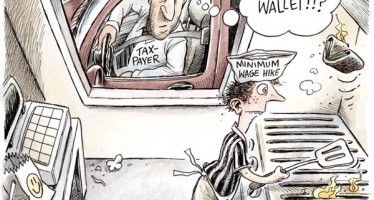Vallejo avoids tough pension fights
March 29, 2010
By STEVEN GREENHUT
(Originally printed in the Wall Street Journal)
In 2008, Vallejo, Calif., was nearly broke. Faced with falling tax revenues, rising pension costs, and unmovable public-employee unions, the city was unable to pay its bills and declared bankruptcy. Now, as it prepares to emerge from Chapter 9, officials in Los Angeles, San Diego and other cities across the state are looking to see if Vallejo has blazed a trail for them to get out from under their own crushing pension costs. What they’re finding is that even bankruptcy may not be enough to break the grip unions have on the public purse.
Vallejo is a Bay Area community of 121,000 that two years ago became the state’s largest city to declare bankruptcy. Like other municipalities, its public-sector unions had driven its budget deep into the red. A report issued by the Cato Institute last September noted that 74% of the city’s general budget was eaten up by police and firefighter salaries and overtime along with pension obligations. The average city in the state spends 60% of its budget on those things.
The study also found that lavish pay and benefit packages were a root cause of the city’s problems. In Vallejo compensation packages for police captains top $300,000 a year and average $171,000 a year for firefighters. Regular public employees in the city can retire at age 55 with 81% of their final year’s pay guaranteed. Police and fire officials can retire at age 50 with a pension that pays them 90% of their final year’s salary every year for life and the lives of their spouses.
Over the past five years, Vallejo has slashed spending where it could, mostly by cutting personnel and services. As a recent San Francisco Chronicle editorial pointed out, the city cut its police force to about 100 officers from nearly 160 and warned residents to use the 911 system judiciously, even while it experienced crime rates higher than other comparable cities in California. The city has also cut funding for a senior center, youth groups, and arts organizations and has done little to restore an increasingly decrepit downtown, develop waterfront properties, or attract new businesses.
To permanently bring its spending in line with its tax base, however, at some point Vallejo will have to do something about its pensions. U.S. bankruptcy judge Michael McManus, as the National law Journal reported last March, “held the city of Vallejo, Calif., has the authority to void its existing union contracts in its effort to reorganize.”
But when it came to voiding those contracts on pensions—a major driver of public expenses—the city blinked. The “workout plan” the city approved in December calls for cuts in services, staff and even some benefits, such as health benefits for retirees. However, it does not touch public-employee pensions. Indeed, it increases the pension contributions the city pays.
This week, the city did approve a new firefighter contract that trims pension benefits for new hires and requires existing firefighters to pay more into their pensions. But that contract doesn’t touch existing pensions. Nor does it affect police officers or other city workers. It also leaves the city with a $1.2 million shortfall. “The majority [of council members] did not have the political will to touch the pink elephant in the room—public safety influence, benefits and pay,” Vice Mayor Stephanie Gomes told me.
Vallejo’s unwillingness to go after existing pensions and wage other fights necessary to put the city on stable financial footing sets a bad example. Other cities will now find it harder to use the threat of bankruptcy (or bankruptcy itself) to get unions to agree to rein in pension costs.
That’s unfortunate. For years, Vallejo and cities throughout the state have fattened pension benefits for public employees, worrying more about the next election cycle than about the ability of their municipalities to make good on lush promises. Now that the bills are coming due, officials are scrambling to find ways to upend gold-plated pension benefits or at least create cheaper benefits for new employees.
For example, after granting two pension increases in the past decade Orange County’s Board of Supervisors is now suing in state court to overturn the portion of those increases that granted a retroactive payment to retirees. The county claims that payout was an unconstitutional gift of taxpayer funds to union employees. But it lost in Los Angeles Superior Court last year and will likely lose again on appeal, notwithstanding the fact that the case seems to be based on sound legal reasoning.
That leaves bankruptcy as probably the most effective tool in the drawer for lowering pension obligations. But if officials are unwilling to demand pension concessions in bankruptcy, there will be few choices left to balance their budgets other than support from the state that itself is facing steep budget deficits, or local tax hikes that could undermine local economies and thereby drive down tax revenues over the long term. That’s a sobering thought in what is an already struggling economy, and an argument for government officials to be much more stingy in granting pension increases in the first place.
Related Articles
CA minimum wage may jump 25%
California has made progress in bringing down the unemployment rate. June’s seasonally adjusted unemployment rate of 8.5 percent is the
State finds savings in minimum wage increase, but counties get the bill
The good news: Last year’s deal to increase the minimum wage won’t cost the state nearly as much as was projected.
Time is Ripe for California Flat Tax
MAY 18, 2011 By JOHN SEILER Now is the time for the innovative Gov. Jerry Brown of the 1970s to




